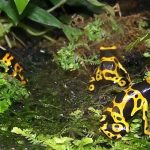How do animals communicate?
The Adams Ant Lab hosted elementary school children from the Junior Explorer Club of Upper Arlington. Recent graduate Mazie Davis and undergraduate students Andrew Mularo and Morgan Oberweiser put together a program to teach the little ones about various ways that animals communicate. First the students played a bioacoustics guessing game – they listened to some diverse audio recordings, courtesy of the Borror Lab of Bioacoustics, and tried to guess what animals they came from.
Can you tell which animals make these sounds? Look for the correct answers at the bottom of this post.
mystery sound 1:
mystery sound 2:
mystery sound 3:
Next the students learned about the use of coloration for communication. They observed camouflage in northern walking stick insects and African ghost mantises, as well as warning coloration in Peruvian black velvet stick insects and yellow banded poison dart frogs.
- Northern walking stick insect
- ghost mantis
- yellow banded poison dart frogs
The last animal communication system we discussed was chemical communication. The students played a game in which they were each given a scented cotton ball (peppermint, almond, vanilla) and were tasked with sorting themselves into groups using only their noses. Then they compared their skills to those of our large Atta ant colony.
The grand finale of the trip was a quick tour of the tetrapod collection lead by Dr. Katherine O’Brien. It was a joy to have such wonderful and inquisitive kids come to visit – we expect to see many of their excited faces return come next spring’s Open House (April 7, 2018)!
About the Author: Morgan Oberweiser is an undergraduate (Evolution and Ecology major) research assistant in Rachelle Adams‘ lab.
Answers to animal sound quiz: sound 1 = American alligator (chickadees scolding the alligator), sound 2 = Texas leafcutting ant, sound 3 = South American catfish






Great post, I wish I’d had an opportunity like these young students had when I was in school! I recognized the alligator from my time in Florida, too bad you don’t have video. These big male alligators have some very low components to their sound and it is loud enough that you can see the vibrating water waves surrounding their bodies while they are bellowing.
Rich, thank you for your comment, I would love to see an alligator calling in the wild; I found a video on YouTube: https://www.youtube.com/watch?v=tAvBADYVb8g – is this what you had in mind?
Here is a link to an even nicer BBC youtube segment with an explanation of the infrasound component and some great high-speed video. https://www.youtube.com/watch?v=SlLuC7257pc
wow, that’s beautiful footage!
The range of togel options is fantastic! Pututogel
asdad
The Junior Explorer Club of Upper Arlington offers an exciting opportunity for kids to discover nature, build skills, and enjoy hands-on learning experiences. Just as exploration shapes young minds, a well-crafted CV shapes careers. Let professional CV writers in UAE help you stand out in the job market!
The look favorably fantastic. Many of these small data tend to be designed making use of lots of background encounter. I’d like everything considerably. WhatsApp网页版
You’ve managed to explain a complex topic in such a simple, helpful way—brilliant work! Take a look at gardatoto if you found this helpful.
medokjitu bandar togel resmi terlengkap
medokjitu bandar togel resmi terlengkap
Several communities possess singles groups which set about enjoyable breast implants aventura things to do mutually, and this also can be is a good choice courting approach. Situations for instance riding a bike, bowling, curling, video hours, dance in addition to humor golf equipment will be arranged from the singles group, also it enables the evenly-distributed number of people to obtain a great in addition to informal night. With focus applied the actual task per se as an alternative to building a intimate relationship, it will require a great deal of pressure off the singles and sites take place a lot more obviously around such a location. ethereum price live
hmmm, mobile marketing is quite interesting, maybe there would be some more money making oppurtunities in it;; bitcoin price in bangladesh